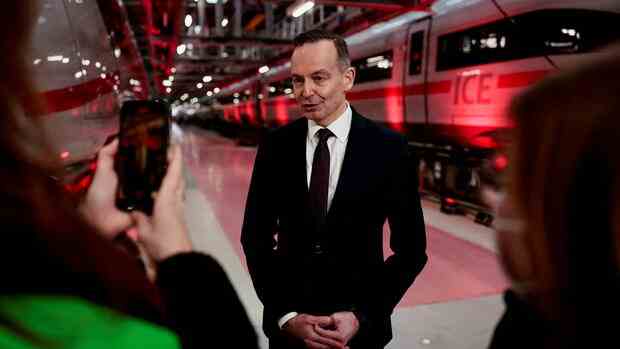The Federal Transport Minister at the presentation of new ICE trains.
(Photo: Reuters)
Berlin With drastic words, the President of the Federal Court of Auditors, Kay Scheller, calls on the traffic light government to fundamentally change its railway policy and to reorganize Deutsche Bahn AG. “Fundamental reforms are needed for the railway system to be able to fulfill its transport and climate policy role – without decisive reversal, the railway system will end up on the sidelines,” Scheller warned on Wednesday. The federal government is “far from getting the problems under control – neither with regard to the rails nor in the control of DB AG”.
The federal government must “pose the organizational question”. Scheller advocated separating the infrastructure divisions from the group and selling the transport companies, i.e. passenger and freight transport.
The reason for the criticism is a new special report by the Court of Auditors to the German Bundestag. The railway is stuck in a “permanent crisis” and is in need of a “reorganization case”, it says. The group’s debt has increased by five million euros a day since 2016, by a total of ten billion to more than 30 billion euros. Earnings in the freight transport division (DB Cargo) and in regional and long-distance transport are “declining, or there are massive losses in some cases”. In the past ten years, the group had to compensate for losses of three billion euros at DB Cargo alone.
“The crisis at DB AG is becoming chronic. Trains are delayed or cancelled. As a result, the reputation of DB AG has been damaged for a long time,” Scheller warned. The condition shows that the integrated group has not proven itself. In addition to the management, the federal government also “contributed significantly” to the crisis. Like the previous governments, the incumbent government had “not taken sufficient steps”.
The Ministry of Transport has “still not determined how large this should be and what area should be developed” for the railway network. Without criteria and goals, the responsible Federal Ministry of Transport lacks “an essential basis for the budgetary prescribed success control of the participation in DB AG”.
The federal government is responsible for the condition of the network
The federal government is involved in the railways “in order to fulfill its guarantee mandate, in particular for the expansion and maintenance of the rail network in Germany,” the auditors instruct the federal government with reference to the Basic Law. The current holding structure is unsuitable for directly influencing the infrastructure companies. The owner should therefore examine “whether and how DB AG can separate itself from its railway companies and thus stimulate competition on the rails”.
Transport Minister Volker Wissing (FDP) wants to leave the infrastructure divisions of the railways in the group. DB Netz, DB Station und Service and DB Energie are to be merged into an “infrastructure company geared towards the common good” before the end of this year. This will “not solve the problems,” said Scheller. The new company will continue to be subordinate to the group. The federal government has “no opportunity to intervene”.
Four years ago, the Court of Auditors submitted a report on the situation of the railways. Since then, the situation has deteriorated, Scheller said. Terms such as “strong rail” and “Deutschlandtakt” are “empty phrases”. The group’s board of directors has been announcing for years that it will improve the situation. However, the situation continued to deteriorate. The railways and the federal government would refer to the increasing demand instead of saying which countermeasures they want to use to solve the problems and in what period of time.
The network is outdated and dilapidated in many places, trains are canceled en masse, especially in freight transport, and they are delayed in passenger transport. Last year, in view of the chaos on the rail network, Wissing declared the railway to be a “top priority” and set up several staff positions in his ministry.
Auditors criticize Deutsche Bahn’s restructuring plan
Together with Bahn boss Richard Lutz, Wissing had announced that heavily used routes would be fundamentally renovated from 2024 in order to increase capacity in the network. The auditors, on the other hand, complain that it is completely “unclear” when the situation on the network will improve with this concept and when the announced “high-performance network” will be available at all.
Wissing also wants to eliminate bottlenecks with smaller construction measures in the short term. This also includes the idea of financing the railways from two funds in the future and no longer from the federal budget every year. In view of the disastrous situation on the dilapidated rail network, the railway itself has announced additional financial requirements of more than 100 billion euros by 2030.
In view of the situation of the railways, the auditors consider it unrealistic to achieve the current political goals: The railways should transport twice as many people by 2030 and achieve a market share of 25 percent in freight traffic. The examiners refer to the past: from 1994 to 2019, the volume of passenger transport increased by just 28 percent. In freight transport, the market share grew from 17 to 19 percent. In view of this, “the growth targets will not be achieved by 2030”, the experts conclude.
More: Wissing’s experts disagree with the ministers – and expect car tolls and the end of combustion engines
